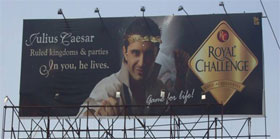Questionable tactics in marketing
Alcohol producers are using questionable tactics to market their beer and liqour brands in the developing world. This is one of the conclusions in a study covering selected advertisements from seven countries.
 A new report studying marketing practices for alcohol in seven developing countries will be presented at the GAPC conference in Bangkok early next year. The study has been conducted by Tom Farrell(picture right), senior lecturer at Oxford Brookes University in England and Dr. Ross Gordon (picture right, below), research fellow at the University of Wollongong in Australia. They have analyzed a sample of 15 alcohol promotions against the regulatory codes governing such marketing in the UK, often cited as a ‘gold standard system’ according to the researchers.
A new report studying marketing practices for alcohol in seven developing countries will be presented at the GAPC conference in Bangkok early next year. The study has been conducted by Tom Farrell(picture right), senior lecturer at Oxford Brookes University in England and Dr. Ross Gordon (picture right, below), research fellow at the University of Wollongong in Australia. They have analyzed a sample of 15 alcohol promotions against the regulatory codes governing such marketing in the UK, often cited as a ‘gold standard system’ according to the researchers.
The UK regulatory system focuses on seven key themes in alcohol marketing, which forbid associations between alcohol and youth appeal, personal/social success, sexual success, driving (sport), immoderate drinking, aggression/toughness, and strength and power. These criteria correspond well with those often used in individual alcohol companies’ own codes of conduct.
 An abstract of the new research report can be downloaded here.
An abstract of the new research report can be downloaded here.
Says the Executive Summary: The results of this analysis found multiple breaches according to the UK codes. In several cases, promotions breached more than one theme from the codes. Seven communications linked alcohol with strength and power, six with sexual success, and four with both personal/social success, and youth appeal. The findings suggest that alcohol producers are using questionable tactics to market brands in the developing world. The industry should re-examine its strategies accordingly, and marketing practitioners should develop more socially responsible practices. Critical social marketing studies such as this can also feed into the upstream arena to inform policy and regulation relating to alcohol marketing, as well as downstream social marketing interventions to address drinking behaviours.”
Cases studied included also brands from large multi-national corporations such as Guinness Foreign Extra owned by Diageo, and Knock Out beer owned by SAB Miller, which associated their products with aggression, strength, virility and power in their marketing. The report also points at the use of strength, power, sexual, social and personal success which could be perceived to be imposing Western neo-liberal social and cultural values and norms, on developing countries.
 “Furthermore, the lack of regulation means that alcohol producers can take advantage and perhaps even re-use tactics now banned in the developed world. Further studies such as ours can be used to hold alcohol producers more accountable for their marketing activities in the developing world. Marketing practitioners should be encouraged to revisit their strategies and develop socially responsible and culturally sensitive practices,” concludes Farrell and Gordon in their study.
“Furthermore, the lack of regulation means that alcohol producers can take advantage and perhaps even re-use tactics now banned in the developed world. Further studies such as ours can be used to hold alcohol producers more accountable for their marketing activities in the developing world. Marketing practitioners should be encouraged to revisit their strategies and develop socially responsible and culturally sensitive practices,” concludes Farrell and Gordon in their study.
RELATED ARTICLES
- New report highlights benefits of policy measures to prevent harmful alcohol consumption
- Alcohol use - a barrier to health and to the achievement of the SDGs
- Government investments in alcohol industry up against the wall
- Abstracts for GAPC 2020 – deadline 29 July 2019
- A regional African alcohol coordination mechanism is needed
- New book reveals a series of unethical business practices by Heineken in Africa
- Next GAPC to be held in Dublin in March 2020
- SAFER – a new WHO initiative to boost national alcohol policy processes
- Trouble Brewing
- WHO Launches Global status report on alcohol and health 2018

